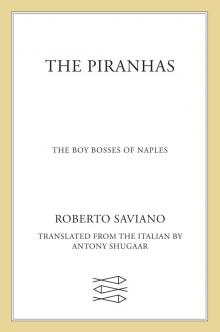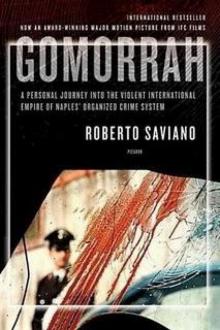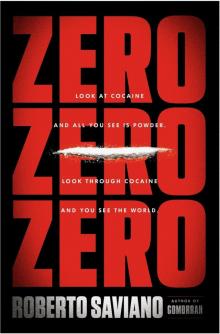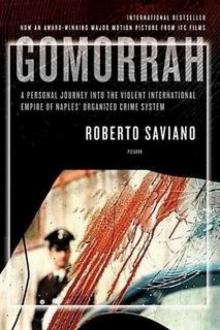- Home
- Roberto Saviano
Savage Kiss Page 35
Savage Kiss Read online
Page 35
Then he whispered in his ear: “You take money from me and from Scignacane. And now I’m here to ask you a favor. A small one. Just a phone call.”
“What kind of phone call?” Don Carmelo looked around, making sure none of his parishioners were within earshot, so that he wouldn’t be seen speaking to a member of the paranza.
“You have two options. Either you make a phone call or else I make your wish come true and you go straight up to chat in person with the Madonna, with Jesus Christ, and with the angels, and maybe you can even do a good turn to your mother and tip her off to a couple of numbers on the Naples lottery.” Pesce Moscio pulled out a pair of twin Viking pistols and crossed them on his chest.
“This is the house of God, put those things down,” said Don Carmelo, but more than an anathema hurled from the pulpit, he seemed to be imploring him.
“Eh, God has seen plenty of things in His time.” Pesce Moscio laughed. “It’s not like He’s going to be scared of a couple of gats. Call this number. Call ’o Pagliaccio.”
“And who’s he?”
“You shouldn’t tell lies, Don Carmelo. You know perfectly well who he is. The Faellas were in charge around here until just yesterday. Call him, and tell him that the Good Lord Almighty can’t accept heroin in the church. Ask him if they can do something, tell him that law enforcement has gone missing around here, that you’re battling all alone, with the force of the Lord.”
Don Carmelo was shaking his head, but Pesce Moscio was sick and tired of this puppet theater. He aimed the pistols, one at the priest’s heart and the other at his testicles. “You need to tell him that Scignacane is going to be here tomorrow afternoon. But don’t name any names. You just need to tell him what I told you, and maybe you’ll still wind up going to heaven.”
* * *
The next day, the church of Cercola was decked out for a festival. Everything had been done in record time, that same morning, by the parishioners assembled by Don Carmelo with a post on his Facebook profile. He apologized for the short notice, but he had decided that the best way to honor the patron saint that the town shared with Naples was to celebrate him a second time with a festive Mass. The faithful forgathered in great numbers and Don Carmelo heaved a sigh of relief. With that crowd, no one would have the nerve to unleash a hail of lead.
Scignacane showed up riding his Honda, accompanied by another high-performance motorcycle carrying two bodyguards. When he saw the flood of people, he dismissed his men, and told them they could come back and get him when the Mass was over.
Don Carmelo appeared and delivered the shortest sermon of his life, reminding them one and all that a man’s rectitude could not be judged by the material possessions he had amassed. Scignacane had taken a seat in the center of the nave, so that he could try to spot Nicolas or anyone else from the paranza, and to ensure he had the broadest field of view, he took part in the Eucharist. No one to be seen. Only the devout and the faithful.
Don Carmelo dismissed the congregation, and Scignacane mingled in the buzz of chattering voices, surrounded by men, women, and children.
Just as he was texting his bodyguard, he recognized one voice over the rest: ’o Pagliaccio.
“It’s a good thing you took communion.”
Two shots to the back of the head, in quick succession.
Silence.
BACKLIT
At Sveva’s house, dinner was served at 7 p.m. sharp. Pesce Moscio had asked his girlfriend why her folks were so obsessed with that Nordic mealtime, and she had told him that it helped to keep your digestion regular. Pesce Moscio didn’t want to argue the point; at Sveva’s house, everything went according to specific rules. Rich people’s rules.
That evening, Pesce Moscio had been invited to dinner, the way he was every Sunday. By now, it had become a habit, a marker of the beginning of a new week. And these things, too—routines, dinner at the same time every day, cloth napkins folded on the plate before the meal could begin—were beyond Pesce Moscio’s understanding. Still, he did his best, just as he tried to provide prompt answers to the rapid-fire questions Sveva’s father shot at him. He was an engineer who had even built the apartment building his family lived in.
“Why won’t you finish high school?”
“Why, how old were you when you finished your degree?” Pesce Moscio shot back, using the informal tu. They’d begun addressing each other informally at their very first meeting, as if it were the most natural thing in the world. Sveva’s father believed in a flat hierarchy; Pesce Moscio was happy to leave the respectful address of voi to others.
“Twenty-five.”
“And how much do you make now?”
“What kind of questions are you asking?” Sveva broke in. She looked to her mother for some implicit support, but instead what she read in her eyes was good-natured indulgence, as her mother smiled the way you might at a smart-aleck kid who could be forgiven anything. Sveva’s father smiled, too.
“Sveva, Ciro has a point when he asks questions like that. In America, when you meet people, that’s where the conversation starts, with money.”
“I like America,” said Pesce Moscio. “That’s a way of figuring out what people are worth right away.”
“What about everything else?” Sveva’s father asked, calmly. “Commitment, education, love of your work?”
Pesce Moscio saw Sveva’s eyes silently begging him to take a step back, but he decided to ignore her.
“You can be courteous and admired, but if you don’t have any money, you stop being courteous and admired, then you’re just an asshole without any money. And I’ve never seen a man of quality without money.”
“Sweetheart!” Sveva chided him.
He changed the subject and the dinner went on without further clashes.
As soon as they left the apartment, he pulled her to him and kissed her the way he had when they first met. How pretty she was when she became a woman warrior. She still seemed somewhat put out, and so to win her back he showed her the baggie of cocaine he planned to offer her group of friends. Sveva looked at the baggie and then at him, and instead of forgiving him, asked him why he always had to play the fool with her group of friends.
“Your friends, the minute they see the sugar, they want to hang out with me.”
“Just because they’re from Vomero, do you think they think they’re better than you?”
“Of course they do. Without sugar, without a pistol, without money, I’m nothing to them. I mean, without a pistol, would you still have fallen for me?”
“I certainly think I would have.”
“So you don’t like it that I have a baggie full of sugar and a handgun?”
“No, I like everything about it, including that … I’m just saying that without them … I’d like you all the same.”
“Okey-doke,” he said, cutting the conversation short, “we’ll see you later at Piazza Bellini.”
* * *
That, too, had become a routine. Sveva went to round up her friends, and then they all joined Pesce Moscio in the piazza because he wanted to check to make sure everything was going smoothly. When he got there, Susamiello, Pachi, and Risvoltino were already there. He had asked them to work as bodyguards for Maraja. After Scignacane’s death, he no longer felt safe, not even in his own piazza.
“Do you know how to shoot?” he’d asked as he handed over their weapons.
“Of course we do,” “Sure,” “Who do you take us for?” they replied, feigning indignation. In fact, they’d never fired a shot in their lives.
The three young paranzielli were waiting for him, standing to attention, proud of the job that meant they could finally pack a sidearm.
There were lots of people. As always. Tourists, students, mid-career professionals in their early forties, and good-for-nothings. Pesce Moscio went to say hello to the piazza boss, who confirmed that everything was going smoothly, but that they were just about out of heroin. Pesce Moscio reassured him, saying that they would resupply soo
n. Actually, though, he had no idea whatsoever how they were going to get their hands on more heroin now. It was a problem that needed to be solved, and quickly, before they could lose more customers, now that heroin for snorting was going like hotcakes. Pesce Moscio walked along, closely followed by the three young paranzielli, who rested their hands on the butts of their pistols, jammed down into their jeans. When the crowd that was swelling around Pesce Moscio—to touch him or just even to greet him and show off the fact that they knew a celebrity—started becoming overwhelming, Susamiello weighed in to clear a path down the street.
A young man approached on a Vespa. He wanted to take a picture of Pesce Moscio because he’d seen him on TV sometime previous. Pesce Moscio’s curiosity was aroused.
“Where did you say you saw me?”
“On the news,” the other guy responded promptly. “I recognized you by your eyes. You’re a legend.”
Pesce Moscio smiled; the heroin and Sveva and her father with his professorial advice seemed light-years away.
“So can I take your picture?”
“Sure.”
The young man pulled out his smartphone and held it high in the air for a minute, as if trying to find the best angle, but he still didn’t seem quite convinced.
“What’s the matter,” asked Pesce Moscio, “am I backlit?”
“No, no, you’re perfect,” he said, and with the other hand he extracted a compact pistol from behind his back. Four shots, right in the face, and Pesce Moscio fell right over, spraying a jet of blood as he did.
“Best wishes from the Acanforas,” said the sicario before speeding away on his Vespa. Before Pachi, in the throes of sheer terror, did the same. Before Risvoltino made up his mind whether or not to pull the trigger. Before Susamiello managed to take aim but still wasted his bullets peppering the plate-glass windows of the café behind them.
THE COPS ALL OVER HIM
Nicolas was standing next to the DJ, in the cone of shadow cast by the floodlights. From there he could keep an eye on the club and see everyone all at once.
It was a new discotheque in Pozzuoli, just opened for business, and the paranza had been invited. Open bar, only for the paranza, the owners had guaranteed, and when they heard those two words, the paranza had been persuaded. Opening night was a success. The bodies weren’t dancing, there wasn’t enough physical space to sway and hip-swivel, so people just rubbed against one another, crammed together as if in an orgy that however still maintained the boundaries of common decency. In the churn of the crowd, the guys found themselves glued against girls who were perfect strangers; they held both arms high as if trying to grab the music as it sprayed out of the speakers, and they ventured to lower their arms only if they picked up on the slightest hint of an invitation, a warm gaze, a smile, and then down they went, both hands, into the sea of bodies, where everything was hidden and their hands were free to wander—and discover.
From his privileged vantage point, every so often Nicolas would identify one of his men, arms wrapped around his own girlfriend or else eagerly focused on cutting in on somebody else’s girlfriend. They were laughing, and they appeared to be utterly carefree. Nicolas, too, was laughing. But his laughter was edgy and bitter. Another brother had been killed. Pesce Moscio had fallen victim to his great undertaking. Nicolas had desired and planned out the death of Scignacane at Micione’s hands, and La Zarina had found out. These old people just wouldn’t stop rearing their heads; they couldn’t seem to get it through their skulls that he was the one riding the crest of the wave now. He knew that these were just the last lashes of the scorpion’s stinger, that sooner or later they’d be forced to knuckle under, just as you ultimately have to bow to God’s will. If God Almighty actually exists, thought Nicolas, who knows if He gets these stomach pains, who knows if He, too, lies awake at night mulling over strategy, money, and accounts.
He threw back a Moscow Mule in a single gulp, and he heard the roar of the crowd. At first he thought they were objecting to the DJ and his terrible music, but the minute he leaned out to look down he understood what was going on.
At the center of the club a small gap had opened in the crowd and all eyes were turned to Lollipop and a young man in torn jeans and a white skin-tight T-shirt. They were quarreling. Lollipop held both arms crossed behind his back, chest puffed out in a provocative stance. Behind him, handbag clutched to her oversized breasts and eyes downcast like a violated virgin martyr, stood Gloria, or whatever the hell her name was, Lollipop’s latest girlfriend.
“What do you think, that this good-looking guagliona is waiting for you?”
“Who the fuck do you think you are?” the other young man replied. “You’re too little for this guagliona.”
“Too little! Now I’ll take a shit right in your mouth.”
“Before I talk to you, you need to put your thoughts at rest, I’m not understanding a thing.”
Nicolas had seen it all, he’d heard it all. The guy had come on to Gloria. Gloria was Lollipop’s girlfriend. She was part of the paranza.
He rushed down to the center of the dance floor, where Lollipop greeted him by slapping a hand on his chest to make it clear to the other young man that things were about to turn very dark for him. The young man with the torn jeans recognized him and took a step back. The mass of spectators eager to relish the clash formed a sort of compact barrier, the perimeter of which the young man navigated while Nicolas stepped up to him, sniffing at him, first his head, then his neck and shoulders, and while the other young man did indeed start retreating, he never once took his eyes off Nicolas.
“So you get the point now?” asked Nicolas, and gave him a couple of slaps in the face.
The young man planted both feet wide, solid as a boulder. He’s not afraid of me, thought Nicolas, he’s not lowering his gaze, he wants to penetrate my eyes. He pulled out his pistol and killed him with a single shot to the forehead. Behind him, the smiling faces of the young crowd were splattered with blood.
A brief moment of silence, and then utter chaos. The security doors were taken by assault, but even then, they didn’t open instantly, creating swirling whirlpools of screaming bodies. Then, at last, they were flung open, and in the blink of an eye the club emptied out, even Nicolas’s paranza was outside now—perhaps swept away in the rush of the crowd, perhaps tugged away by their girlfriends. He left the corpse behind him on the floor, tucked the pistol into his pants pocket, and watched the discotheque empty.
* * *
The first to get back in was none other than Lollipop.
“Maraja,” he said, yanking on his arm, “what did you do that for?”
“He looked at me,” Nicolas retorted, and tried to shake loose from Lollipop’s grip, but now Lollipop grabbed his other arm as well.
“Hurry up! The sirens! Don’t you hear them?” And he dragged him toward the exit. “The cops are coming! Get moving!”
“What the fuck are you talking about!” But even as he was replying he recognized the shrill sound.
Yes, he could hear them now, and they sounded very close.
The paranza was waiting for him outside and they’d even already started his TMAX. They all took off, bent over the handlebars, heads lowered to cut through the air, like a flock of sparrowhawks. Behind them, the timid rays of the rising sun mixed with the flashing lights of the rushing squad cars. Then, nothing but the increasingly dense orange of broad sunlight as the new day got under way. The sirens were dying away now, the squad cars must have stopped at the new club. They slowed down a little. They’d made their escape.
They were heading away from home and toward the water, which was already blazing bright. Nothing could be more beautiful. They rode past Castel dell’Ovo, opening out in a fan shape like boats cutting across the water.
Briato’ slammed on the brakes, and Drone, riding right behind him, braked hard in his turn to keep from hitting him.
“What the fuck are you doing?” he said, but then he noticed the police car stopped
at an intersection. Inside, two officers were staring out at them, but they showed no signs of being about to pursue them. Drone immediately veered away, and so did all the others: two other cars were now cordoning off the intersection they’d just passed through.
“Maraja…” yelled Tucano, but Nicolas didn’t let him continue, and instead pressed his thumb down on the TMAX’s horn. In the sleepy morning, that blaring sound was like a blasting cap. Out of the windows of the surrounding apartment buildings alarmed faces appeared here and there, and even the street began to fill with a few rubberneckers, who’d popped out of who knows where.
“Shoot,” Nicolas yelled, “put somebody down!”
Lollipop was the first to get his Beretta out and leveled, and he fired off a shot at an elderly man who hadn’t been quick enough to retreat behind the front door. He was still dressed in his boxer shorts, and a white sleeveless T-shirt covered with wrinkles clung to his skinny body. The bullet caught him in the belly and his creased old body, without resistance, folded up and dropped slowly to the sidewalk.
When Lollipop turned again to look for Nicolas, he’d already turned down a side alley. The cop cars took off, tires screeching, while people poured out of the buildings and into the streets, moving in the opposite direction from what instinct would have advised, as if salvation were out there, in the open. Tucano, Drone, and Briato’ revved wildly into the small knots of people forming on the sidewalks and found gaps that let them escape into the alleys.
Lollipop saw them vanish as he shoved the pistol down his pants and took off a few seconds later. But too late.
The cops were all over him.
ON THE RUN
Nicolas meant to live his life on the run with his head held high. Ten days, a month, a year, ten years. He’d never been to Nisida Reform School, just as he’d never been behind bars at Poggioreale, but now he found himself where a crime boss sooner or later is bound to wind up. That’s why, even while he was still fleeing the police, he’d put in a call to ’o Cicognone with excitement throbbing in his voice, an excitement that had then been transformed into feverish expectation when he’d seen ’o Cicognone waiting with pick and mortar in Ponticelli, outside the walled-up apartment building where, some time earlier, Stavodicendo, too, had lived out his brief time on the run. But he wasn’t going to make the same mistake, he wasn’t going to let them catch him the minute he set foot back out on the street, he’d sworn to himself while Briato’ and Tucano used the pick to demolish the wall that ’o Cicognone rebuilt, depriving him—brick upon brick—of both light and air. He’d transform that building into a tower from which he could issue commands to the outside world. With discipline. ’O Cicognone himself had assured his personal comfort with a brand-new generator: “This is a gift from L’Arcangelo,” he had told him, and Briato’ had done his part, with a PlayStation.

 Savage Kiss
Savage Kiss The Piranhas, The Boy Bosses of Naples
The Piranhas, The Boy Bosses of Naples Gomorrah
Gomorrah ZeroZeroZero
ZeroZeroZero Gomorrah: A Personal Journey into the Violent International Empire of Naples’ Organized Crime System
Gomorrah: A Personal Journey into the Violent International Empire of Naples’ Organized Crime System